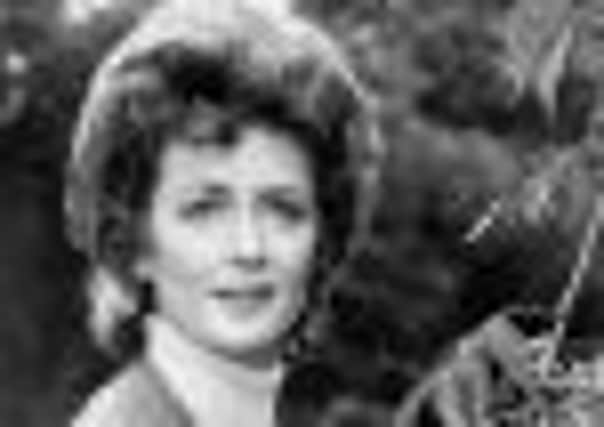Obituary: Elspet Gray, Blackadder and Tenko actress who worked tirelessly for Mencap


With her striking auburn hair and welcoming smile Elspet Gray made an instant impression both on stage and screen. At the beginning of her career she appeared often with her husband, Brian Rix, in the Whitehall Farces but later became widely recognised for her resolute appearances in Dr Who, Blackadder and Tenko. Gray was a fine comedienne and an actress who exuded class, charm and an understated charisma.
Gray became a national figure away from the stage as a charity worker on behalf of Mencap. In 1951 her own first child, Shelley, was born with Down’s syndrome and she and Rix decided to campaign for greater awareness of the condition.
Advertisement
Hide AdAdvertisement
Hide AdIn 1977 he retired from the stage and became the secretary-general of Mencap.
Elspet MacGregor-Gray’s father (James MacGregor Gray) worked for Lloyds Bank in India. She was educated at St Margaret’s School in Hastings and in India.
After attending London’s Royal Academy of Dramatic Art she appeared, in 1947, at Leeds, in Robert Morley’s Edward, My Son and again when it transferred to the West End.
Rix was the leading farceur of the era and ran his own company which mounted very successful comedies. Rix invariably played the “silly-ass” character and built up a huge following at the Whitehall Theatre in London.
In 1949 he auditioned Gray and was smitten the moment she began her reading. He offered her a part in his next play at Bridlington and proposed. She declined repeatedly but during the run of Reluctant Heroes she accepted.
The play transferred to the Whitehall Theatre and ran for four years. Gray also appeared in the film version that starred Ronald Shiner.
Gray became firmly established with the Rix Company and appeared in a succession of hits such as Wolf’s Clothing, Uproar in the House and Let Sleeping Wives Lie. In the last play Gray co-starred with Leslie Crowther and Andrew Sachs and was credited as contributing to the “near crazy-farcical flow” of the evening.
She also appeared in many live television relays from the Whitehall Theatre that became a feature of BBC1’s schedules on bank holiday weekends. Rix was the star – he was known as “the best dropper of trousers in the West End” – presenting more than 80 such productions from 1956 with a formidable cast in farces by the likes of Ben Travers.
Advertisement
Hide AdAdvertisement
Hide AdGray was seen in Scotland in two important revivals, firstly in Alan Ayckbourn’s The Norman Conquests and in Move Over Mrs Markham. Two years later she was back in London for a glorious production of Charley’s Aunt with Griff Rhys Jones.
In the 1970s Gray was much seen on television. Her appearance in Dr Who as Chancellor Thalia demonstrated her ability to play a cool lady of a certain age.
There followed The Many Wives of Patrick with Patrick Cargill as a disorganised and much married millionaire playboy; then Gray was in The Crezz, a major 11-part drama that centred on the inhabitants of a London crescent.
In 1981 she was cast as Felicity Kendal’s mother in the Carla Lane sitcom, Solo, in which she much enjoyed playing the elderly widow who shocks her daughter by taking a toy boy.
The same year Gray appeared as Phyllis Bristow in Tenko, the drama about the British women who were prisoners of the Japanese during the Second World War.
One of Gray’s last official outings was two months ago to a Tenko reunion.
In 1983 she was Rowan Atkinson’s mother, Queen Gertrude of Flanders, in the first series of Blackadder. She clearly had much fun with the role.
Gray’s Queen was delightfully absent-minded throughout and had a wild affair with a Scottish laird. There is a glorious moment when the Queen assures the King he is not dying and Gray then looks straight into the camera and winks.
Advertisement
Hide AdAdvertisement
Hide AdOther television appearances included Dr Findlay, Fawlty Towers, Dinnerladies, Poirot and Morse. In 1994 she played the mother of the first bride in Four Weddings and a Funeral.
Gray worked tirelessly for Mencap. As Mark Goldring of Mencap said yesterday: “Elspet was, in her own way, just as involved with Mencap and the wider issues of learning disability as Brian and was a powerful advocate and campaigner.”
She is survived by her husband, two sons and a daughter. Shelley, her daughter who had Down’s syndrome died in 2005.
Alasdair Steven